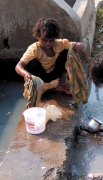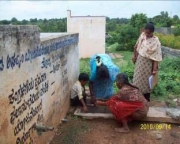/regions/political
Political
Cancun: Is it a climate meet with a difference?
Posted on 25 Dec, 2010 07:58 PMDespite the pre-Cancun Wikileaks revelation of U.S. strong-arm tactics at the Copenhagen summit, and U.S. climate envoy Todd Stern's remarks about "climate bribery", wherein he said countries asking for aid were in no position to accuse the U.S. of bribery; it is largely perceived that the Cancun Climate Meet has picked up the lost momentum of Copenhagen.
193 nations met at Cancun to debate on how to move forward on the climate change adaptation process and drafted the Cancun Agreement.
Saving rice - Ambitious plans to increase productivity
Posted on 24 Dec, 2010 10:13 AMEnormous funds are being poured into research aimed at improving seed varieties, with a heavy focus on developing hybrid rice. Is it the right option for millions of small rice farmers who are already battling high input costs and increasingly unpredictable weather? Or does part of the solution lie in efficient methods of cultivation that will cut down water use and improve yield?
Rice intensification for increasing productivity in Koraput, Odisha
Posted on 24 Dec, 2010 10:12 AM
Photo: Muralidhar Adhikari
The economic impacts of inadequate sanitation in India: Rs. 2.4 Trillion equivalent of 6.4 per cent of GDP – A report by WSP
Posted on 24 Dec, 2010 09:27 AM This study report by the Water and Sanitation Programme (WSP), a global partnership administered by the World Bank suggests that inadequate sanitation causes India considerable economic losses, equivalent to 6.4 per cent of India's GDP in 2006 at Rs. 2.4 Trillion. It analyzed the evidence on the adverse economic impacts of inadequate sanitation, which include costs associated with death and disease, accessing and treating water, and losses in education, productivity, time, and tourism. The findings are based on 2006 figures, although a similar magnitude of losses is likely in later years.
This study report by the Water and Sanitation Programme (WSP), a global partnership administered by the World Bank suggests that inadequate sanitation causes India considerable economic losses, equivalent to 6.4 per cent of India's GDP in 2006 at Rs. 2.4 Trillion. It analyzed the evidence on the adverse economic impacts of inadequate sanitation, which include costs associated with death and disease, accessing and treating water, and losses in education, productivity, time, and tourism. The findings are based on 2006 figures, although a similar magnitude of losses is likely in later years.
The study focused on the safe management of human excreta and associated hygiene behavior. The methodology adopted by the study included disaggregating the economic impacts of inadequate sanitation into health-related impacts including premature deaths, costs of treating diseases, and productive time lost due to illnesses; domestic water-related impacts including household treatment of water, and money and time costs to obtain safe water; welfare losses including additional time spent by people for accessing toilets or open defecation sites, and girls having to miss school, and women not going to work; and the loss of potential tourism owing to inadequate sanitation.
Data on incidence (e.g. diarrheal diseases, deaths, etc.) were compiled from national sources (National Family Health Survey, WHO Demographic and Health Surveys, and other Govt. of India sources). Based on scientific literature, attribution factors were used to estimate the populations impacted by inadequate sanitation. Economic valuation was carried out using costs/prices based on secondary studies.
Film Festival on "Green Unplugged"
Posted on 23 Dec, 2010 12:05 PMContent and Image Courtesy: Culture Unplugged
Culture Unplugged Studios will be launching ‘Green Unplugged’ - the festival where we unite to explore the nature, that flows without & within us. This festival aspires to contemplate on the environment and the need to co-create future generation with love & respect for mother earth. It aspires to overlap the sound of our cry today with that of nature and hopes to collectively perceive a new path. We invite your conscious films that may help us all wake to our holistic future - an integral individual & human community thriving in co-existence with nature. With your co-operation, the festival hopes to bring context to our existence and reveal the evolving divine - the truth of life, hidden in nature‘s dream of tomorrow.
Evaluating and mapping of SCS Curve Numbers for Lokapavani catchment of Karnataka
Posted on 22 Dec, 2010 09:58 PMThis study by Geospatial World attempts to collect and analyse data concerning the catchment characteristics that affect direct runoff such as soil type, land cover and rainfall for the catchment of Lokapavani river in Karnataka using remote sensing and GIS techniques. An attempt has been made to determine the weighted average Curve Number (CN) for different land use, land cover and soil types in Lokapavani catchment in order to estimate the runoff.
Benefits, issues and status of WATSAN systems - A survey of an IDWM project supported by Arghyam
Posted on 22 Dec, 2010 07:56 PM This paper presents the results of a survey of WATSAN systems implemented under an Integrated Domestic Water Management (IDWM) project supported by Arghyam and implemented by MYRADA and MYKAPS in Bangarpet and H D Kote blocks of Kolar district of Karnataka. Arghyam has promoted Roof-top Rain Water Harvesting (RRWH) and eco-sanitation systems in its various project areas through its partner organizations.
This paper presents the results of a survey of WATSAN systems implemented under an Integrated Domestic Water Management (IDWM) project supported by Arghyam and implemented by MYRADA and MYKAPS in Bangarpet and H D Kote blocks of Kolar district of Karnataka. Arghyam has promoted Roof-top Rain Water Harvesting (RRWH) and eco-sanitation systems in its various project areas through its partner organizations.
This project aimed at developing an integrated approach to domestic water management. It focused on construction of RRWH and eco-sanitation toilets in four villages in the project area in Kolar with the aim of creating models of integrated management of domestic water and sanitation in a rural set-up.
Seminar on Indian Northeast Monsoon - Recent Advances and Evolving Concepts (INEMREC) - 2011, Chennai
Posted on 22 Dec, 2010 05:16 PMOrganizers:
Water Jobs via DevNetJobsIndia.org dated December 22, 2010
Posted on 22 Dec, 2010 11:27 AMContent Courtesy: DevNetJobsIndia
- State Consultant, Water Safety and Security
Ma Foi Consulting Solutions Limited
Voelkel Industrie Produkte (VIP) GMBH Exhibiting in EA Water, Mumbai
Posted on 21 Dec, 2010 06:13 PMOrganizer: EA Water Private Limited